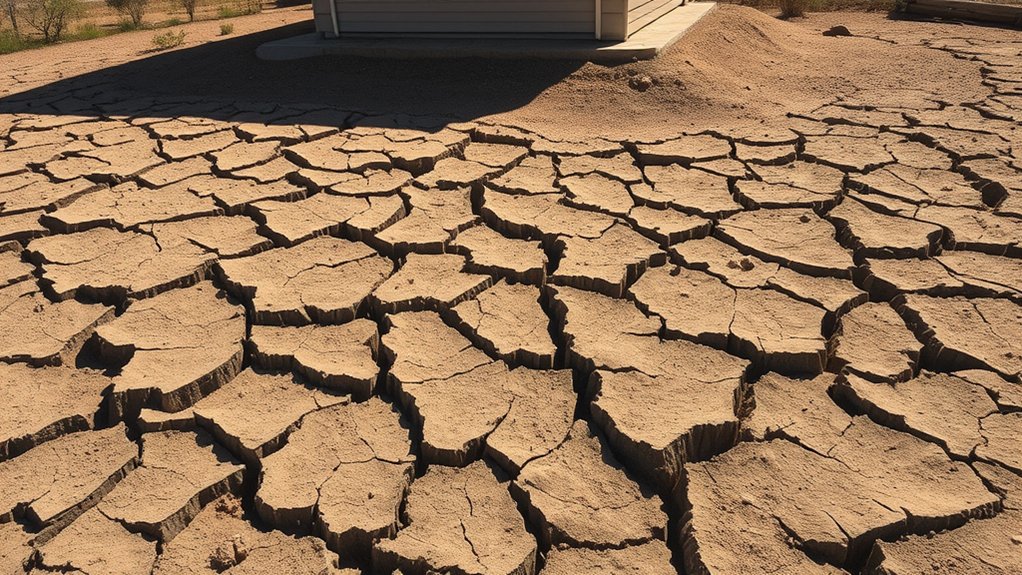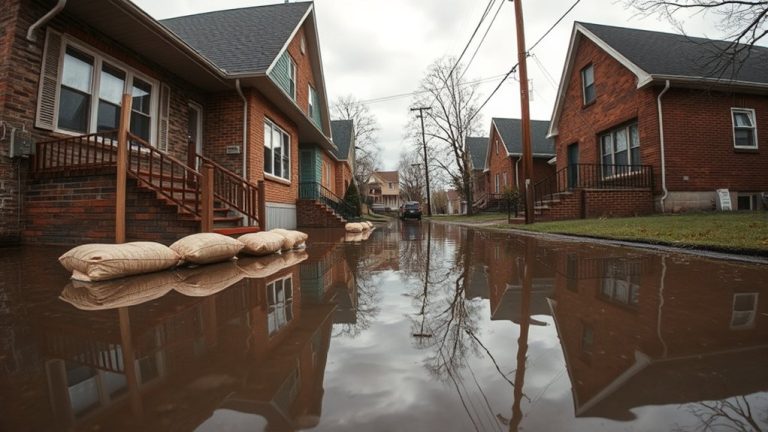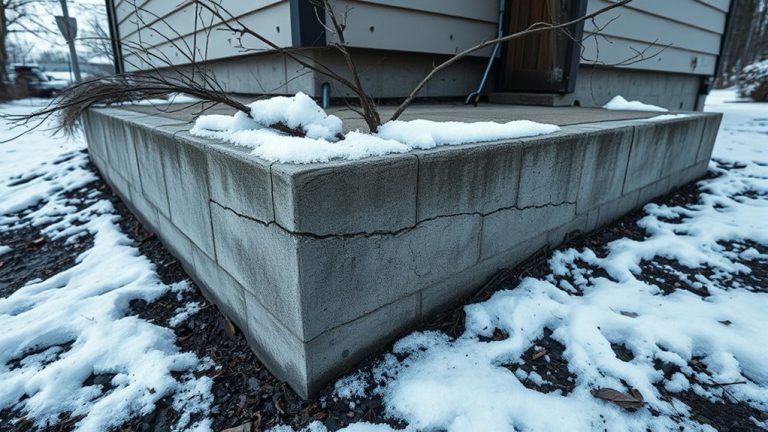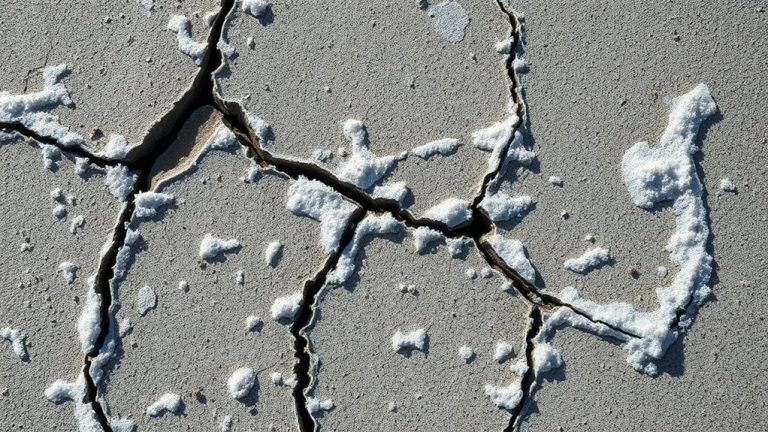Summer's scorching temperatures can wreak havoc on your home's foundation, turning soil into a destructive force. As heat intensifies, the ground beneath your house expands, contracts, and shifts, creating immense pressure on your foundation's structural integrity. You might not see the damage immediately, but these subtle changes can lead to significant problems that'll cost thousands to repair. What hidden risks are lurking beneath your home's surface?
Key Takeaways
- Summer heat causes clay-rich soils to expand dramatically, creating significant pressure against home foundations and inducing potential structural stress.
- High temperatures accelerate soil moisture evaporation, leading to ground contraction and creating uneven support beneath building structures.
- Thermal soil shifts during extreme summer conditions can generate microscopic ground movements that progressively compromise foundation integrity.
- Differential soil expansion caused by intense heat creates unequal pressure zones around a foundation, potentially causing cracking and settling.
- Prolonged summer temperature variations induce repeated soil expansion and contraction cycles that gradually weaken foundation structural stability.
How Soil Moisture Impacts Foundation Stability
When it comes to foundation stability, soil moisture plays a critical role in determining the long-term health of your home's structural integrity. Soil hydration patterns directly influence how your foundation responds to environmental changes. Foundation repair experts in Syracuse, NY recommend professional assessment to prevent potential structural damage caused by soil moisture fluctuations. Different moisture absorption rates can cause soil expansion or contraction, which puts immense stress on your home's foundation. You'll want to monitor these shifts carefully, as they can lead to cracks, uneven settling, and potential structural damage.
The Science Behind Ground Contraction and Expansion
Soil motions reveal a fascinating interplay of physical forces that drive ground contraction and expansion.
When temperatures rise, the ground experiences differential soil expansion, causing clay-rich soils to swell dramatically. Your foundation bears the brunt of these changes, as soil thermal operation transfers heat through underground layers.
These microscopic shifts can create tremendous pressure against your home's structural base, potentially leading to foundation cracks and uneven settling. Understanding these natural processes helps you anticipate and alleviate potential foundation risks before they become costly repairs.
Common Signs of Heat-Related Foundation Damage
Because heat can wreak havoc on your home's foundation, homeowners should know the telltale indicators of thermal-induced structural stress. Uneven settling might signal serious ground movement, creating visible shifts in your home's structural alignment.
Watch for excessive cracking along walls, floors, and exterior surfaces, which often indicate underlying foundation strain. These signs aren't just cosmetic; they're warning signals of potential structural compromise. Your home's stability depends on recognizing these early symptoms.
Pay attention to doorways that suddenly stick, windows that won't close properly, or floors that feel uneven when you walk across them.
Preventative Measures for Protecting Your Home's Foundation
If foundation damage threatens your home's structural stability, proactive safeguarding becomes essential. You'll want to implement concrete reinforcement techniques that protect against summer heat's destructive potential.
These strategies include maintaining consistent soil moisture by strategic landscaping and using soaker hoses around your foundation's perimeter. Soil stabilization strategies can also help, such as installing proper drainage systems and ensuring ground slopes away from your home's base.
When to Call a Professional Foundation Repair Expert
Despite your best preventative efforts, some foundation issues require professional intervention. Recognizing when to seek expert help can save you significant time and money in the long run.
Here are 4 critical signs you'll want to call a foundation repair professional:
- Visible cracks wider than 1/4 inch
- Doors and windows that suddenly stick
- Uneven or sloping floors
- Significant seasonal weather changes affecting natural soil fluctuations
Professional experts can diagnose complex problems, recommend targeted solutions, and prevent further structural damage. Don't wait until minor issues become major expenses—act quickly and protect your home's integrity.
Long-Term Consequences of Ignoring Summer Foundation Stress
Summer's intense heat can wreak havoc on your home's foundation, setting the stage for potentially devastating long-term structural complications. Foundation subsidence patterns emerge as soil moisture depletes, causing ground shifts that stress your home's structural integrity.
Heat-induced soil erosion weakens foundational support, creating uneven surfaces and potential structural damage. If left unchecked, these issues can lead to significant repair costs, compromising your property's value and safety. Ignoring early warning signs might seem convenient, but it'll finally cost you more in extensive repairs and potential structural failures down the road.
Frequently Asked Questions
Can Summer Heat Cause My Foundation to Crack Permanently?
Summer heat can cause foundation cracks when soil moisture changes and extreme temperature fluctuations stress your home's structural integrity, potentially leading to permanent damage if you don't address underlying ground movement quickly.
How Quickly Can Extreme Heat Damage a Home's Foundation?
Extreme heat can rapidly damage your foundation in weeks. Soil moisture fluctuations and temperature shifts cause ground movement, triggering cracks and structural stress faster than you'd expect during intense summer conditions.
Are Older Homes More Susceptible to Summer Foundation Stress?
You'll find older homes are more vulnerable to foundation stress due to aging materials and less sturdy construction techniques, potentially compromising your foundation stability during intense summer heat.
Will Homeowner's Insurance Cover Foundation Damage From Summer Heat?
You'll likely face challenges with insurance coverage for foundation damage, as deferred maintenance and seasonal temperature fluctuations can void your claim, leaving you responsible for costly repairs.
Can Landscaping Help Prevent Summer Heat Foundation Problems?
You can prevent foundation issues by strategically adding garden mulch and managing soil moisture, which stabilize ground conditions and protect your home's structural integrity during intense summer heat.



